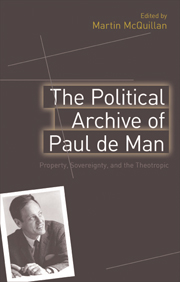Book contents
- Frontmatter
- Contents
- List of Abbreviations
- Acknowledgements
- Notes on Contributors
- Introduction: Broken Promises: Rousseau, de Man and Watergate
- 1 Lovence in Rousseau's Julie ou la Nouvelle Héloïse
- 2 Reading Spectacles in Rousseau's Letter to d'Alembert
- 3 The Utter Misery of the Human Mind: Apotropaic and Theotropic in de Man's Rousseau
- 4 Rhetoric and Rausch: de Man on Nietzsche on Value and Style
- 5 Theotropic Logology: J. Hillis Miller, Paul de Man and Kenneth Burke
- 6 Normativity, Materiality and Inequality: The Politics of the Letter in Paul de Man
- 7 Inscribing the Political: Paul de Man and the Wild Art of Letter Writing
- 8 Mistake in Paul de Man: Violent Reading and Theotropic Violence
- 9 Lightstruck: ‘Hegel on the Sublime’
- 10 De Man vs. ‘Deconstruction’: or, Who, Today, Speaks for the Anthropocene?
- 11 Paul de Man at Work: What Good is an Archive?
- 12 DNA: de Man's Nucleic Archive
- 13 Sovereign Debt Crisis: Paul de Man and the Privatization of Thought
- Appendix: Nietzsche I: Rhetoric + Metaphysics
- Index
11 - Paul de Man at Work: What Good is an Archive?
Published online by Cambridge University Press: 05 August 2013
- Frontmatter
- Contents
- List of Abbreviations
- Acknowledgements
- Notes on Contributors
- Introduction: Broken Promises: Rousseau, de Man and Watergate
- 1 Lovence in Rousseau's Julie ou la Nouvelle Héloïse
- 2 Reading Spectacles in Rousseau's Letter to d'Alembert
- 3 The Utter Misery of the Human Mind: Apotropaic and Theotropic in de Man's Rousseau
- 4 Rhetoric and Rausch: de Man on Nietzsche on Value and Style
- 5 Theotropic Logology: J. Hillis Miller, Paul de Man and Kenneth Burke
- 6 Normativity, Materiality and Inequality: The Politics of the Letter in Paul de Man
- 7 Inscribing the Political: Paul de Man and the Wild Art of Letter Writing
- 8 Mistake in Paul de Man: Violent Reading and Theotropic Violence
- 9 Lightstruck: ‘Hegel on the Sublime’
- 10 De Man vs. ‘Deconstruction’: or, Who, Today, Speaks for the Anthropocene?
- 11 Paul de Man at Work: What Good is an Archive?
- 12 DNA: de Man's Nucleic Archive
- 13 Sovereign Debt Crisis: Paul de Man and the Privatization of Thought
- Appendix: Nietzsche I: Rhetoric + Metaphysics
- Index
Summary
Well, what good is identifying the differences in the archival sequence for the understanding or reading of ‘Allegory of Reading (Profession de foi)’?. The manuscript is entitled with a striking phrase, ‘Theotropic Allegory’. The word ‘theotropic’ appears just once in the manuscript, two pages after the sentence about how the inability to read should not be taken too lightly. The word ‘theotropic’ vanishes from the finished essay. Why? That disappearance is surely a crux.
In pages excised from the final revised essay de Man begins by saying once more that the ‘deconstruction of rhetorical models that base the referential power of a language on a substantial relationship between sign and meaning (and thus on their implied polarity) [that would be “symbol” as defined in “The Rhetoric of Temporality], is an invariant of Rousseau's thought. It articulates the political to the linguistic code’ (TA 132-3). De Man makes a comparison between ‘the double-faced notion of referentiality that we keep discovering’ (TA 133) and the opposition between the busy world of society and the hortus conclusus of Julie's garden.
On the one hand, referentiality is so broad and vague that it might refer to almost anything. Referentiality is ‘transcendence’ of the linguistic in general. On the other hand, it narrows down to ‘the finite horizon of a specific semantic “space”. Like Julie's garden, it sets up a fence, and it provides the key with which the properly initiated readers can open the gate that leads into the privileged, private property of the referential meaning' (TA 133).
- Type
- Chapter
- Information
- The Political Archive of Paul de ManProperty, Sovereignty and the Theotropic, pp. 149 - 156Publisher: Edinburgh University PressPrint publication year: 2012

